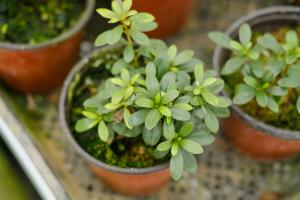Introduction
Potted vegetables are a fantastic way to grow your own produce even if you have limited outdoor space. However, like any type of gardening, potted vegetables can be prone to pest problems. In this article, we will discuss some companion planting options to deter bugs and pests from attacking your potted vegetables.
Companion Plants to Deter Bugs
Companion planting is the practice of growing two or more different types of plants together to benefit each other. Some plants have the ability to repel harmful insects, while others can attract beneficial insects that help to pollinate and control pests. Here are some companion plants that are known to deter bugs:
Mint: Planting mint near your potted vegetables can repel pests like aphids, cabbage moths, and flea beetles.
Marigolds: Marigolds have a strong scent that can repel harmful insects like nematodes, whiteflies, and tomato hornworms.
Basil: Planting basil close to your potted tomatoes can deter tomato hornworms and whiteflies.
Lavender: Lavender can attract beneficial insects like bees, butterflies, and ladybugs that will help to pollinate and control pests.
Planting Tips
When companion planting with potted vegetables, it's important to choose plants that have similar growing requirements. Here are some tips to help you get started:
Select companion plants that have similar light and water requirements to your potted vegetables.
Make sure your potted vegetables are planted in a suitable potting mix that drains well.
Choose companion plants that are compatible with the type of vegetable you are growing.
Plant companions around the edges of your potted vegetables or in separate pots nearby.
Don't overcrowd your potted vegetables with too many companion plants.
Avoiding Common Mistakes
While companion planting can be an effective way to deter bugs and pests, there are some common mistakes to avoid:
Avoid planting vegetables that are incompatible with each other.
Don't plant too many companions in a small space, as this can lead to overcrowding and competition for resources.
Be careful not to overwater your potted vegetables or their companion plants, as this can lead to root rot and other problems.
Be aware that some companion plants can have negative effects on certain types of vegetables. For example, planting onions near beans may inhibit their growth.
Conclusion
Companion planting can be a great way to keep bugs and pests away from your potted vegetables. Plants like mint, marigolds, basil, and lavender all have pest-repelling properties that can be helpful in deterring harmful insects. By following some simple planting tips and avoiding common mistakes, you can enjoy a successful and healthy harvest of potted vegetables.

 how many times do yo...
how many times do yo... how many planted tre...
how many planted tre... how many pine trees ...
how many pine trees ... how many pecan trees...
how many pecan trees... how many plants comp...
how many plants comp... how many plants can ...
how many plants can ... how many plants and ...
how many plants and ... how many pepper plan...
how many pepper plan...































